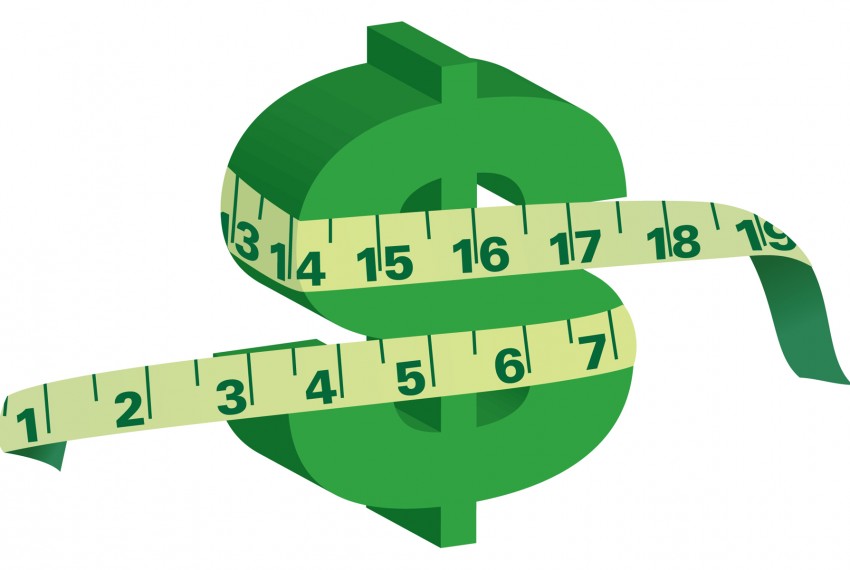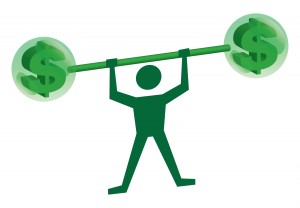
Finding solid financial ground
Financial fitness isn’t about how much you have — it’s about understanding where you’re at, knowing where you want to be, and having a plan to get there.
According to the 2015 Genworth Canada Homeownership Study, 23% of respondents believe they have great financial fitness and 48% say they have good fitness. But that leaves 29% who rate their fitness as fair, not very good, or very bad.
No matter how you rate your financial fitness, the following 10 tips should help improve it.
1) Figure out where your pocket money is going:
The cash you have after paying regular fixed costs is called discretionary income. If you need to cut back or ramp up savings for an unforeseen expense, you will use your discretionary income. (Unless you use credit, which is a bad strategy.)
For the next month, keep all of your receipts. At the end of a month, you’ll have a whack of them (include automated credit-card transactions). Now, categorize the receipts: food, taxis, books, clothes: the categories will show themselves based on your personal spending habits. Tally each category.
If the numbers are higher than you want, you need a budget you can stick to.
2) Determine your net worth:
Why? Because it’s part of what lending institutions use to determine your credit worthiness today; and it represents your future financial independence (as you age, you want this number to go up to pay for retirement).
How? Add up your assets — the assessed value of your home and other real estate; any investments and money in bank accounts; the value of any vehicles. Now add up everything you owe — the amount of your mortgage or mortgages, balances on lines of credit, credit cards, car loans, and all other debts. Finally, subtract what you owe from your assets, and you’ll have your net worth.
3) Automate savings:
Whether it’s an emergency fund, RRSP or TFSA, you have to make paying yourself as important as paying your bills.
Many experts recommend this should be 10% of your income, and suggest amassing three to six months of living expenses.
Make saving a lifelong habit from the time you start earning money. It’s also a skill parents should pass on to their kids.
4) Decrease insurance payments:
If you’re paying monthly for coverage (life, home, car, etc.), a reduced payment frequency can often earn you a better deal. Contact your providers and ask.

5) Increase mortgage payments:
It’s the opposite with your mortgage: more frequent payments save money by reducing the amortization period. If you’ve been comfortably paying monthly, try accelerated bi-weekly. To see if this strategy could help you save, simply check out our Homeopener mobile resource, and plug your own numbers into the calculator.
6) See a professional:
Should you top up your RRSP or contribute to your kid’s RESP? Do you need more insurance? Are you on track to retire when you want, with the income you want? Experts can run models to answer and make recommendations.
Pay for the unbiased advice of a fee-only advisor, or visit your bank and speak, for free, to an expert there.
7) Do the math on credit card points:
Rewards often come with a higher interest rate (and an annual fee). If you pay your balance in full every month, points are worth it. If you carry a balance, the increased interest rate might undo any financial benefit of the points.
8) Look at your credit report—and your partner’s—every year:
If you’re living together, you have a financial interest in each other’s lives, including possible legal responsibilities for each other’s debts. Full disclosure is required.
Also, a strong credit score is worth money if you ever need a loan. Lending institutions give preferred rates to preferred customers, namely those in the 750+ set. Visit www.equifax.ca
9) Have an answer to this question:
What would you do if you lost your job tomorrow? You should have a plan and, ideally, enough liquid savings to get you through a job search. For some industries, that could take longer than others.
10) Commit to learning:
You need to care about your financial fitness as much as you do about your physical fitness. There’s always more to learn. Got your spending and debt under control? Great. Now get a book on investing and self-directed plans. If you’re having trouble figuring out how to rein in your spending, there’s a blog or podcast for you. Find and follow it.
These tips should help you achieve a better understanding of where you’re at, where you want to be, and how best to plan for a financially fit future.
Article Credit: http://homeownership.ca/financing/saving-for-a-down-payment/finding-solid-financial-ground/ | Genworth Canada
